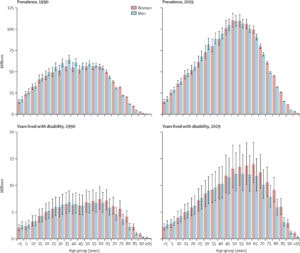Rehabilitation is defined as
‘’a set of interventions designed to optimize functioning and reduce disability in individuals with health conditions in interaction with their environment”. It is care that can help you get back, keep, or improve abilities that you need for daily life. These abilities may be physical, mental, and/or cognitive (thinking and learning).
According to the World Health Organization (WHO), rehabilitation is one of the essential components of Universal Health Coverage (UHC), which features alongside “promotion of good health, prevention of diseases, treatment and palliative care. Thus, rehabilitation focuses on achieving functional independence in activities of daily living (ADL), participation in work, recreation and education, with individuals being able to achieve meaningful roles in daily life.
Globally, 1 in 3 people today are estimated to be living with a health condition that would benefit from rehabilitation. This need is predicted to increase in the coming years due to changes in the health and characteristics of the population. (Ref Link)
Statistics
Globally in 2019, 2·41 billion (95% UI 2·34–2·50) individuals had conditions that would benefit at some point during the course of disease from rehabilitation services, contributing to 310 million (235–392) YLDs .This number had increased by 63% (61–64), from 1·48 billion (1·43–1·54) in 1990 .
Prevalence
The prevalence was nearly equal in men (1·19 billion [95% UI 1·15–1·23]) and women (1·22 billion [1·18–1·27]), but women had more YLDs (163 million [124–206]) than men (146 million [110–186]). Globally, the counts of both YLDs and prevalence were highest for people aged 50–70 years and lowest in people aged 95 years and older.

Global number of prevalent cases with conditions that would benefit from rehabilitation and the corresponding years of life lived with disability by age and sex with 95% uncertainty intervals, 1990 and 2019.
Drug and alcohol treatment programs generally fall into 1 of 2 categories — inpatient or outpatient rehab.
Inpatient Rehabilitation
Inpatient recovery programs, also known as residential treatment, require patients to check themselves into a controlled environment to overcome their addictions. Patients stay at a clinic with 24-hour medical and emotional support.
Outpatient Rehabilitation
Outpatient drug rehab is less restrictive than inpatient programs. Outpatient recovery programs usually require
10 to 12 hours a week spent visiting a local treatment center.
Who might need a mental health rehabilitation service?
Individuals having
problems with organizing and planning your daily life – finding it hard to plan and actually carry out what you mean to do being exploited or abused by others harmful use of alcohol and non-prescribed (“street”) drugs. You may have difficulties because: medication just doesn’t work well enough for you. The illness affects your concentration, motivation and ability to organize yourself you also suffer from depression and anxiety.
What treatments and support are provided?
- Therapies (e.g cognitive behavior therapy etc) aims to rectify drug-seeking behaviors, instill better coping mechanisms, and teach important relapse prevention skills.
- Guidance on healthy living (e.g diet, exercise and stopping smoking).
- Help to reduce or stop alcohol and street drug use.
- Support to manage everyday activities such as personal hygiene, laundry and more complex living skills such as budgeting.
- Help with accommodation and social security benefits.
Rehabilitation Services
Your rehabilitation service should be helping you to regain your skills for community living, with the same opportunities as anyone else. You need to be able to have useful and interesting activities Rehabilitation units should provide a safe and homely space where you can feel comfortable, safe and are able to have safe relationships with other people.
Professionals working in rehabs will have specialist expertise in the long-term treatment and care of people with severe mental illness and complex needs. They look at the long-term possibilities for the patient, not just symptoms of the illness, and work closely within a team of other professionals.
Rehabilitation units should provide a safe and homely space where you can feel comfortable, safe and are able to have safe relationships with other people.
Conclusion
Rehabilitation is needed by an increasing number of individuals because the ability to live longer, productive life with multiple chronic conditions. Health professionals and nurses in acute care settings have an important role to identifying who will benefit for rehabilitation services.
To the emaanclinic.com administrator, Thanks for the well-researched post!